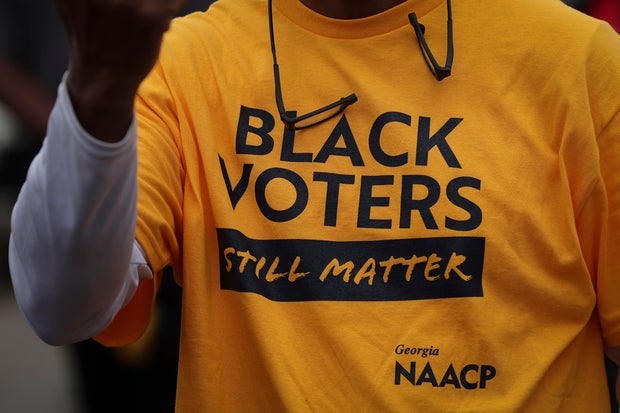James Butler, a 42-year-old black Democrat who lives in Atlanta, is planning to vote for BIden president in November — but he’s not as enthusiastic this time.
“I think this is the best we can get,” he said of the 2024 elections.
Butler is not alone among black voters in Georgia in his lack of enthusiasm about voting for Biden a second time.
A CBS News Late February Poll showed that 76% of black likely voters said they supported his re-election bid, down from the 87% who voted for him in 2020. In 2020, Georgia was one of Biden’s closest wins, with fewer than 12,000 voters making the difference – and black voters were a key part of Biden’s winning coalition there.
The Biden-Harris campaign appears to have noticed. Vice President Kamala Harris on Monday kicked off a multi-state tour in Atlanta to talk about investing in communities of color and opportunities for minority families to build wealth under the Biden administration.
Win McNamee/Getty Images
“We will continue to talk about the record and work being done to advance economic opportunity for young people of color across the country,” said Michael Tyler, campaign spokesman.
Organizers at the New Georgia Project, an Atlanta-based black voter advocacy group, believe younger men have been particularly slow to return to Biden’s fold.
“Young black men are more likely to say they will vote for Trump,” said Ranada Robinson, a researcher at the New Georgia Project. “But what concerns me most this year is that about 30% were undecided at the time of our survey.”
Robinson says misinformation is playing a major role in some black men’s declining interest in Biden.
“Particularly online, there are some narratives that deflect credit from some of the victories we’ve seen in America,” she said. “There’s also some distribution of blame. When you look at certain Supreme Court decisions or some of the things that have long-term impacts on past administrations, this administration is suffering the consequences of that.”
But other supporters of the president say they are simply not excited about a 2020 rematch.
“I think my vote is the same, but I’m less enthusiastic,” said Phillip Dunwood, 21, a student at Georgia State University. “It’s more like ‘alright, let’s get this over with.'”
Meanwhile, Republicans are looking to remove black men from Biden’s base, but they don’t have the resources they had in previous cycles. The RNC’s Black American Community Center in College Park, Georgia, was one of many minority outreach centers that opened before the 2022 midterms and are now closed.
“We can do a better job [at outreach]” said Azad Ahmadi, a member of the Georgia Black Republican Council (GABRC).
Instead of national infrastructure, the party relies on local auxiliary groups like the GABRC to make inroads into the black community. Darryl Wilson, another member, says the group is using the guidance as a way to persuade black men to consider voting Republican in November.
“We held black conservative summits. We held ‘barbershop political forums.’ We bring government to people in local communities, wherever they can ask direct questions and get direct answers,” Wilson said.
The Black Conservative Federation (BCF), a network of African-American Republican activists, released its 2024 get-out-the-vote political plan titled “Black Men Matter” in April. The plan will have the group’s outreach organizers target Black men in six swing states — Georgia, North Carolina, Wisconsin, Michigan, Florida and Pennsylvania — through outreach and grassroots programming.
But Democrats say Republicans are still far from proving their investment in black communities.
“To show up at an election time and suggest that they are courting black voters, except to say ‘Democrats aren’t doing enough’ or to say ‘you should stay out of this because this election isn’t worth getting involved in and Trump was a little better for you and the National Party was a little better for you,’ I just don’t believe it,” said Georgia voter Anre Washington. “It has never in my voting life been a good faith effort on the part of the Republican Party.”






















